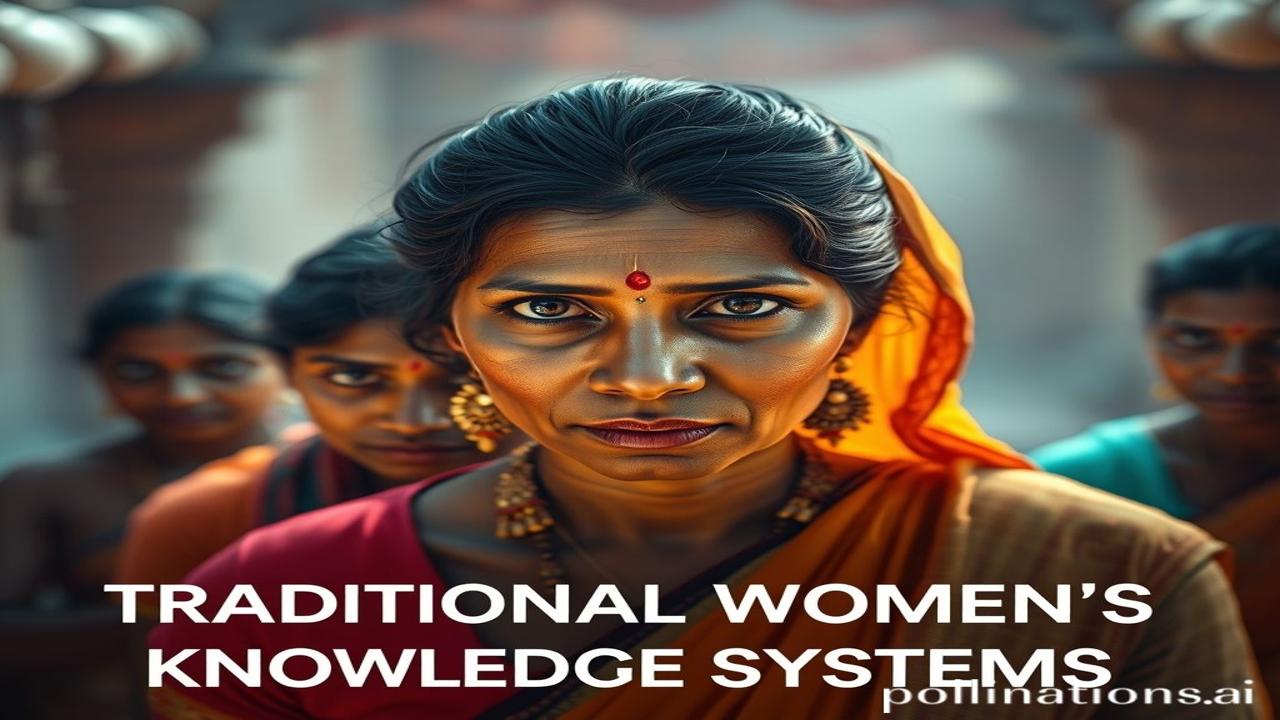Waqt Ki Dhool Mein Chhupi Shakti: Unveiling Traditional Women’s Knowledge Systems
Kabhi socha hai, grandmother ki remedies mein woh power kahan se aati thi? Unke geeton mein chhupi philosophy, unke hath se bane designs mein chhupi geometry… Waqt ki dhool mein kuch kahaniyan chhup jaati hain, kuch ज्ञान (gyan) ki dharaayein. Aaj hum usi dhool ko hatakar dekhenge, India ki un women ki taraf, jinhone knowledge ke deepak ko peedhi dar peedhi jalaye rakha. Let’s dive into the fascinating world of Traditional Women’s Knowledge Systems.
Itihasik Pishthbhumi: A Tapestry of Wisdom
Traditional Women’s Knowledge Systems (TWKS) kya hai? Simple words mein, yeh woh accumulated knowledge, skills, practices, and beliefs hain jo women ne generations se gather kiye hain. Yeh primarily oral tradition se transmit hua hai. Think of it as a living library, passed down through stories, songs, rituals, and hands-on training.
When did this start? Well, it’s as old as civilization itself! Indus Valley Civilization se lekar modern India tak, women ne ek crucial role play kiya hai knowledge ko preserve aur transmit karne mein.
Why is it important? Because it holds the key to sustainable living, healthcare, agriculture, art, and social harmony. Yeh woh foundation hai jispe hamari culture khadi hai. Yeh hamari dharohar (heritage) hai. Often, these knowledge systems were essential for survival. Consider the knowledge of medicinal plants, for example, often passed down through generations of women. This was crucial in societies where access to formal healthcare was limited.
Zameeni Sach – Log Aur Jeevan: Glimpses into Everyday Life
Imagine a rural village in ancient India. Ma Yashoda apne bachchon ko neem ki pattiyaan chabaane ko de rahi hai, bata rahi hai ki yeh pet ke liye kitni acchi hoti hain. Dadi apne poti ko embroidery seekha rahi hai, har taanke mein ek kahani bun rahi hai. Yeh scene sirf ek family ka nahin, balki ek poore samaj ka hissa tha.
“Beti, yeh dhaniya (coriander) seed hai. Isko aise bow, aur yeh aise ugaega,” a mother explains to her daughter, passing down generations of agricultural knowledge.
Women weren’t just homemakers; they were doctors, healers, artists, teachers, and entrepreneurs. Unki knowledge hi unki shakti (power) thi. Rulers ki baat karein toh, Rani Lakshmibai ki courage aur intelligence history books mein amar hai. But let’s not forget the countless unsung heroines – the farmers, artisans, and midwives whose knowledge kept communities alive.
Dharohar Aur Pehchan: Echoes of the Past in the Present
Aaj bhi, TWKS hamari zindagi mein zinda hai. Consider traditional Ayurvedic practices, where women continue to play a pivotal role in preparing medicines and providing care. Think of the vibrant folk arts and crafts passed down through generations of women artisans. The colours, patterns, and techniques are all infused with ancient knowledge and wisdom.
Yeh “Bharatiyata” ka ek important part hai. It reminds us of our roots, our values, and our connection to the land. In a world that is becoming increasingly globalized, it is vital to preserve and celebrate these unique expressions of our culture.
We see it in:
- Festivals: Many rituals and practices during festivals like Diwali, Holi, and Teej are rooted in TWKS. The food, the decorations, and the songs are all part of a larger tradition passed down by women.
- Language: Many proverbs, sayings, and folk songs are imbued with the wisdom of TWKS. These linguistic treasures offer valuable insights into our history and culture.
- Values: Values like sustainability, community, and respect for nature are deeply embedded in TWKS. These values are more relevant than ever in today’s world.
Mazedar Tathya Ya Bhram-Bhanjak: Unveiling Surprises
Log samajhte hain ki traditional knowledge outdated hai. Lekin asli sach yeh hai ki TWKS sustainable aur eco-friendly practices ko promote karta hai. Many modern techniques are now looking back to traditional knowledge for sustainable solutions.
A recent study showed that traditional agricultural practices, often developed and practiced by women, are more resilient to climate change than modern farming methods.
Drishya Aur Bhavnaayein: Sensing the Past
Imagine the aroma of spices grinding in a stone mortar, the soft texture of silk being woven on a handloom, the rhythmic chanting of mantras during a healing ritual. Picture the vibrant colours of Rangoli patterns adorning the courtyard during Diwali. The air smells of incense and marigolds. The temple walls feel cool to the touch, worn smooth by centuries of devotion. The sounds of women singing folk songs echo through the streets.
These sensory experiences are a vital part of TWKS, connecting us to the past and grounding us in the present.
Antim Vichar Ya Uddharan: A Thought to Ponder
Traditional Women’s Knowledge Systems are a treasure trove of wisdom, resilience, and cultural richness. Let us make a conscious effort to preserve, celebrate, and learn from this invaluable heritage.
“स्त्री शक्ति जगजननी, सृष्टि का आधार, ज्ञान की ज्योति से रोशन करे, हर घर संसार।” (Stri Shakti Jagjanani, Srishti ka adhar, Gyan ki jyoti se roshan kare, har ghar sansar.) – Woman power is the mother of the world, the foundation of creation, may the light of knowledge illuminate every home and world.
